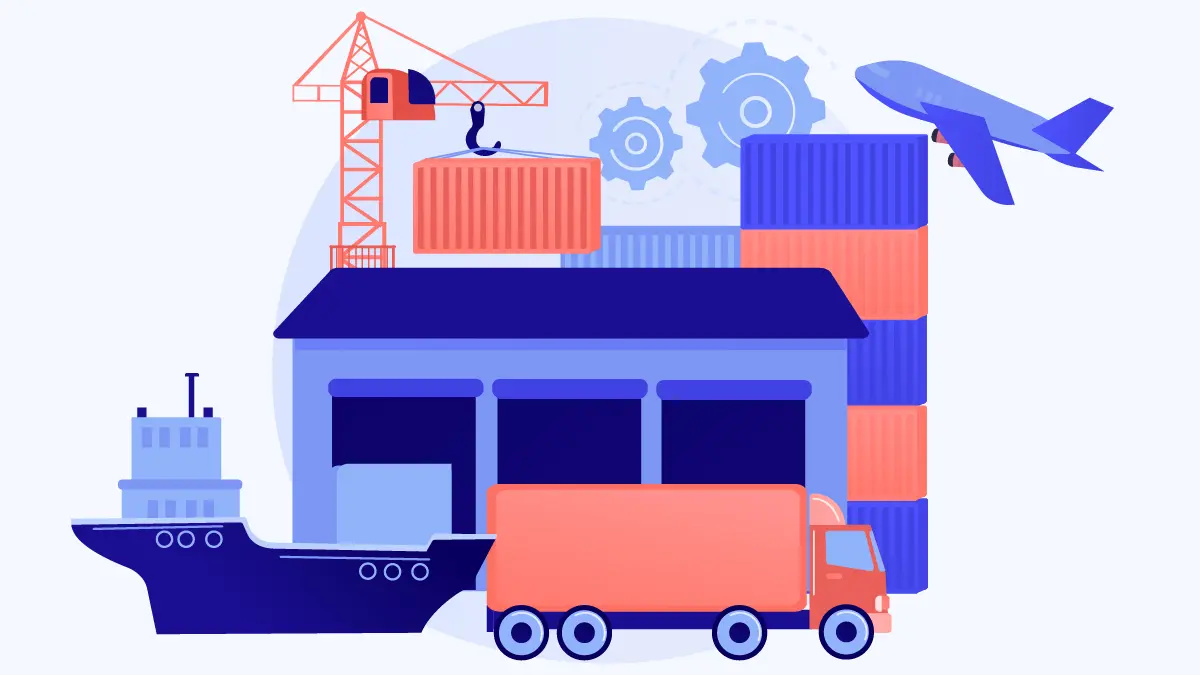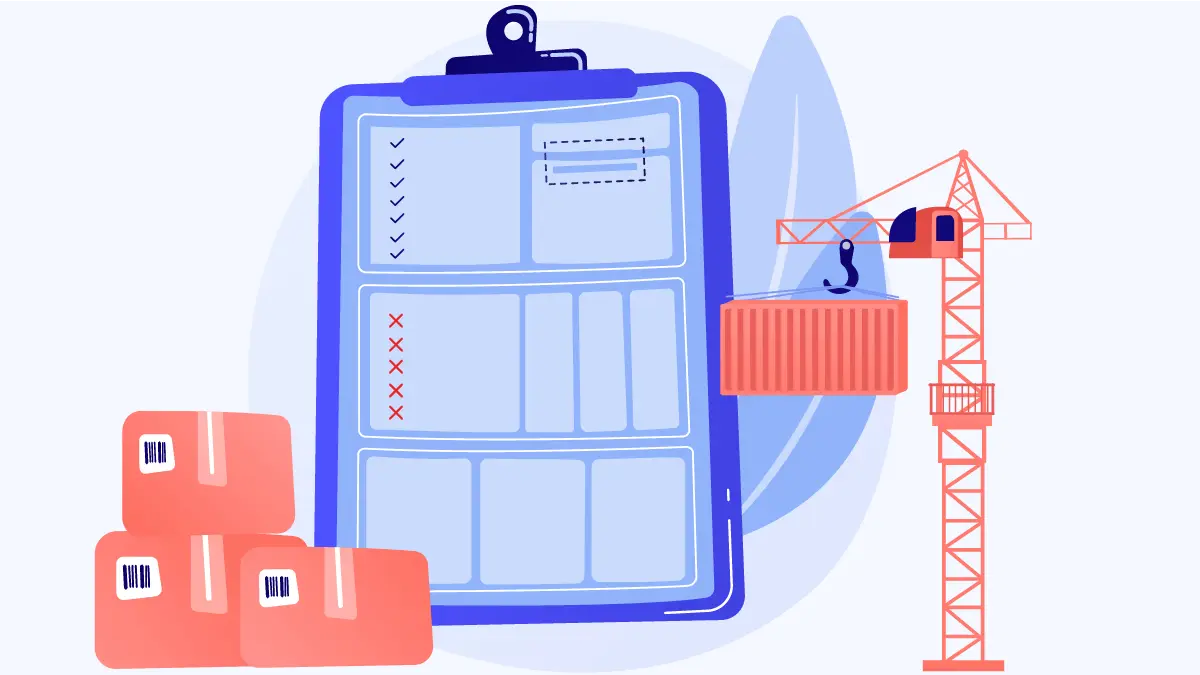- Home
- Complete Guide Freight Management Service Solutions
A Complete Guide to Freight Management Software Solutions

Freight management is an umbrella term encompassing various processes that help move freight efficiently and strategically from its point of origin to its destination. The process includes ensuring coordination between multiple parties, modes of freight transport and technologies.
The process is quite elaborate and complex and involves physical assets such as trucks, robots, warehouses, distribution facilities, technological solutions, and professionals with supply chain management expertise.
The technical definition of freight management is the process of a shipper hiring a logistics service provider (LSP) to move his cargo from one place to another while efficiently and strategically using various modes of transport, employing their expertise and other resources.

Freight Management includes the entire process of organising and streamlining inbound and outbound goods for transportation. Simply put, the process makes sure that the goods are delivered to their destined place in sound condition within the stipulated time.
Freight management majorly deals with coordinating well with various stakeholders involved in getting goods from point A to point B, such as vendors, carriers, truck drivers, distributors, end customers, etc. The whole process is carried out with one key goal; the cargo should reach its right place at the right time in the proper condition.
As a part of ensuring that the freight makes it to the destination in the right condition, the process of freight management also involves actively monitoring the goods and dealing with any issues that may arise in due course.
In most of the cases, the term freight management is used in the context of full-truckload, less-than-truckload and small shipments. For large shipments that involve the sea and air transport, the process tends to get a bit more complicated.
Today, there are a wide variety of freight management solutions available in the market. While some companies have in-house freight management systems, some companies opt for off-the-shelf solutions.
A freight management service solution helps drive cost savings and process efficiencies while saving costs via automation and data-driven supply chain management.
Before we jump into the details of what freight management entails, let’s take a look at how the service that logistics service providers provide and the freight management solutions available in the market today came to be.
Freight management service systems were born as freight brokers, and Transportation Management System service providers started revamping their existing systems. TMS was initially limited to one-to-one transactions; however, when it went beyond that and started capturing more data points, the system became more capable. A significant turning point in reight management systems development was Transportation Management Systems’ transition to cloud platforms.
The emergence of cloud-based systems transformed the way these systems were used. Above all, upgrading these systems became more effortless than ever before. It enabled automation of processes to a greater extent and started capturing data in a way that simplified analytics.
The next stage in the evolution of these systems involved freight management service solutions market. Logistics service providers started selling their solutions to shippers. The solutions became available to shippers at a lower price as compared to top tier Transportaion Management Solutions.
In recent times, more and more companies have turned towards these solutions and given the value they offer, their adoption is set to increase. These solutions are helping companies drive savings, increase efficiency and save time.
As Logistics Service Providers (LSPs) try to explain the value their solutions have to offer, year after year several terms have merged for freight management systems.
Some of the terms used to describe freight management systems include:
- Inbound Freight Management
- Outbound Freight Management
- Managed Logistics Services
- Managed TMS
- Transportation Management Services
- Supply Chain Management
- Managed TM
- Managed Transportation Services
The common usage of all these terms illustrates the industry’s inability to lock down one specific word for these solutions. Over and above this, each system has a USP, and hence the difference in its name. However, the lack of a common name for these systems often acts as a barrier for companies trying to get a full listing of companies that provide the service.
Freight management is more of an umbrella term, encompassing several processes involved in moving freight from one place to another. This management quite literally involves everything from the time the goods are set to leave the warehouse to the time they reach the end customer.
The process indeed involves a variety of activities and is quite complicated. To get an idea of what all goes into freight management, you can refer to the list below:
- Route optimisation: Planning to make sure that the route you are choosing is the fastest route possible
- Freight rate negotiation: Negotiating with vendors or carriers to get reasonable rates Accounting and auditing: Tracking transactions involved in the process of shipping goods
- Accounting and auditing: Tracking transactions involved in the process of shipping goods
- Data collection: Capturing and analysing various data points to draw insights
- Claims and insurance: Handling insurance and managing claims in case of lost or damaged goods
- Tariff and regulations: Ensuring that goods transportation process is compliant with government protocols
- Warehouse management: Optimising and managing space in the warehouse
- Carrier and vendor management: Building and maintaining relationships with stakeholders involved in the supply chain.
- Integrations: Working with third parties to streamline and optimise the supply chain in various ways.
Freight management involves multiple processes, operations, stakeholders, and technologies; it is only then that the supply chain’s smooth functioning becomes possible. Several interconnected aspects go hand in hand in the process and when leveraged well, drive cost and process efficiencies.
While both in-house off-the-shelf systems have their drawbacks, it is generally accepted that businesses don’t have the time and expertise to develop and maintain systems that can be regularly updated. Moreover, the process of building a system that works perfectly fine may and often does get quite laborious. As a result, most of the companies tend to rely on reputable third-party freight management solutions.
There is a wide range of freight management service solutions that companies implement into their supply chain. Shippers often depend on Transportation Management Systems to procure rates, track shipments in real-time, auto-reconcile freight invoices , gain actionable insights based on in-depth data analysis and more. A freight management system, in a nutshell, acts as one in all solution for all logistics management related issues.
Earlier, purchasing a freight management system was considered to be an investment. However, with changing times, this investment has become more of insurance. In times of disruption, it is these systems that are helping companies stay afloat. Regardless of whether a shipper ships goods to a single destination or multiple destinations or light or high-volume capacity, freight management software helps them drive efficiency and save costs.
The best feature of cloud-based platforms is that they are scalable in nature and come packed with multiple solutions. These solutions are dynamic and can be used effectively by various stakeholders.
If you’re considering buying a freight management solution, here’s everything you need to know:
An Introduction to the Freight Management System solution
Freight Management Systems are Software-as-a-Service (SaaS) platforms that allow users to streamline their supply chain with various digital solutions.These systems can be used to set up LTL, FLT, intermodal, multimodal and other services. A freight management system can take care of everything from the ground to express delivery and help you optimise your freight operations.
What does a cloud-based freight management software solution mean? It implies that the user doesn’t have to download or install the software on an individual computer or system. The software can be accessed from a desktop, mobile, tablet or laptop at any time from anywhere. Thus, cloud-based systems offer a great deal of flexibility for users in terms of accessibility and convenience.
From a single dashboard, the user can access all functions, reports and other tools. The dashboard is built to display multiple resources such as best carrier rates, schedule pick-ups and deliveries, and even tracking of shipments in real-time. Earlier, each of these functions required the user to depend on different systems. However, modern-day freight management software solutions have packed all these tools into a single system.
If you manage to invest in the right freight management system at the right time, it will yield results within no time. Needless to say, other benefits of adopting such a system include cutting down on manual efforts, endless paperwork and hours that go into doing tasks that the software automates. These solutions thus allow your team to focus on more meaningful tasks.
Following is a list of some of the features that a freight management software offers:
- RFQ management:
Freight management software allows you to create enquiries for your shipment within minutes. Besides, it will enable you to share the enquiry with all your vendors simultaneously.
Every time a vendor submits his quotation, the system displays his rank in the bidding process and notifies other vendors every time their rank changes. The system nudges your vendors to reduce price and secure the first rank to increase their chances of winning business.
What happens here is that each vendor is potentially negotiating with every other vendor to give you the best price.
- Freight rate benchmarking
Freight Management Systems allow you to benchmark rates by comparing the price you pay for a shipment with the real-time market price that your competitors are paying for similar shipments. This helps ensure that you are paying the right amount for your shipment.
- Rating freight movements
The cost involved in shipping is a significant concern for most shippers. Earlier, shippers would spend hours contacting individual carriers and ask for rate quotes. Once they received a few estimates, they would make a decision based on the freight shipping rates.
Thanks to the emergence of Freight Management Systems, the process has become hasslefree. There are tools that shippers can use to find shipping rates in real-time. All they have to do is enter the shipping details, and the system will immediately display the rates of various shipping lines.
- Scheduling Pick-Up and Delivery
Once you know what your freight movement will look like, you can further use the system to streamline the process. You can enter all pick-up, delivery expectations, service levels, and schedules on the system.The system will take care of the rest by tracking the operations and sending you automated updates.
- Effortless documentation
A freight management solution eliminates the need for physical copies as it digitalises documentation. This impacts the environment positively and makes it possible for your team to access documents within seconds.
- Real-time tracking
Once the delivery leaves the warehouse facility, the shipper can set up their freight management system to track the shipment in real-time. Sound systems allow the shipper to share these tracking details with other stakeholders involved in the process as well. This helps ensure unprecedented transparency and visibility, along with enhanced customer service in the process.
Today, there are enough options to choose from in the market. What’s critical is your ability to recognise your business’s needs and then identify a system that best suits those needs.
On average, a freight management program can help shippers save up to 2 to 10% on its total freight spend. However, it’s important to note that calculating total savings in the ROI equation requires us to consider much more.
It doesn’t necessarily mean that an expensive system translates to a competent one when it comes to freight management service programs. It could, in some instances, only mean that the system is costly. With this context in mind, let’s look at some factors or elements that can drive a freight management solution’s prices.
Freight management programs usually involve two types of costs- one-time implementation costs and on-going operations costs. The one-time implementation costs typically include general system set-up, file integration, training and more.
The service, cost and naturally, the savings involved varies depending on the volume of shipments, level of visibility over supply chain the shipper hopes to gain and how big and complex his supply chain network is.
Managed TMS solutions typically can be associated with the following savings percentage:
Here’s everything you need to know about savings related to logistics planning and freight management with a freight management service program.
- Planning and logistics optimisation
3% - 12% savings opportunity via the ability to analyse shipments, freight rates, optimise freight transport mode.
- Execution & advanced transparency
2% - 5% savings opportunity via automation of various workflows, enhanced carrier performance management, real-time visibility over shipments.
- Seamless audits
2% - 5% savings opportunity via an automated billing process, accurate invoice matching.
- Procurement
3% - 10% savings opportunity via the ability to engage with many vendors and secure the best possible rates through automated freight negotiation.

Freight Management in the simplest of terms implies moving goods from one place to another at the right time, to the right destination, in the right condition and quality successfully. As the process isn't as straightforward as it sounds, it requires accurate planning and exceptional coordination between several stakeholders involved in the process.
Efficient freight management involves the following steps:
- Benchmarking freight rates and operations
- Automating repetitive and tedious processes
- integrating all your supply chain management functions so that everyone involved in the process has access to the same set of information
- Diversifying your carrier network as well as engaging with multiple freight forwarders
- Taking proactive steps to improve communication with drivers and other third parties involved
- Having clear KPIs in place to tracking supply chain performance
- Considering and staying up to date with all the tariffs and related regulations
- Focusing on customers and business partners
- Leveraging the right tools to improve inventory management
- Negotiating better freight rates with the help of RFQ management systems
- Relying on tools that facilitate seamless audits and transparent transactions
- Investing in gaining real-time visibility over supply chain management
Implementation of a freight management service depends on the kind of business you run and the industries associated with your business. Typically, the freight management service provider evaluates your existing systems and suggests solutions that can be adopted and based on your business’s requirements. Implementation of an efficient freight management service has the following four core functionalities:
- Freight Management
A freight management system can keep track of multiple activities in real-time. It allows you to negotiate and manage rates from a single dashboard, check rates of various carriers for easy comparison and more.
By managing freight with the help of a freight management service software, you can cut down on unnecessary expenses, reduce wastage of resources, automate workflows and make processes faster and more efficient while saving costs.
- Execution
With a Freight Management software performing various tasks becomes a breeze. The software offers real-time visibility on the movement of your goods and allows you to track them anytime and anywhere.
It also allows you to access all information regarding your shipments on a single platform and share information such as tracking details with your customers. The system also lets you communicate with drivers while tracking time and distance remotely.
The platform enables you to make informed business decisions irrespective of the circumstances.
- Planning
Optimising the shipping process is one of the critical goals of freight management software. The system provides all the necessary data and analytics to optimise your shipping process and deliver goods at the right time to the right place in sound condition.
You can ensure that no resources go unutilised or underutilised through efficient planning with the system’s help.
The analytics from freight management solutions can further be linked with business intelligence applications to make way for in-depth analysis. The insights gained in the process can be used to explore new trends and opportunities.
- Administration
Freight Management systems also have features that allow better administration of logistics-related tasks. This includes features such as billing, invoice generation and reconciliation, payments, tracking payments and more.
Modern-day advanced freight management systems have become one in all solutions tackling a wide range of logistics-related challenges and pain points.
Once adopted, freight management service software becomes the control centre of your logistics process. It communicates and keeps track of crucial information in real-time and allows you to analyse and make timely operations changes. Undoubtedly, the accurate implementation of the freight management service program is of great importance.
Many organisations with export-import oriented businesses refrain from employing, updating or changing freight management service systems due to the presumption that the implementation process can be lengthy, tedious, and costly.
It's important to note that a failure can cost you even more than the resources if you don’t implement the system properly. Thus, it's essential to ensure proper implementation of the system you decide to invest in.
Freight management system implementation may seem complicated, but it doesn't necessarily have to be complex. With the right research, approach and decisions, the implementation process can be seamless—and you can start reaping the rewards of the solution in no time.
The freight management service system's implementation process can take about two weeks or even as long as two years, depending on several factors. These factors can range from the extent to which you want to implement the service, the level of integrations required and expected, and your team.
While you may prefer quick implementation, you don’t want to lose the momentum along the way; even small mistakes can lead to poor results.
Hence, it’s best to create a reasonable timeline aligned with your budget and goals and document everything throughout the process. This will help you stay on track and keep the project well organised. The key is to plan well and keep a close track of everything.
Logistics Service Providers tend to prefer the freight management business model, and it's essential for you as a shipper to understand the reasons behind it.
Here's why LSP’s and 3PL’s like the freight management business model:
Usually, a logistics service provider’s services tend to progress in the following order with each service getting more elaborate than the previous one. Freight Management Program is considered to be all-inclusive in this context.
Service for spot shipments is usually a one-time that involves meeting the shipper’s immediate capacity requirements. These shipments have high margin; however, many a time are challenging to execute.
When a shipper opts for a shipment program, it implies that the logistics service provider is assigned specific routes along with a volume estimate. It is usually a one-year commitment.
Many times shippers have seasonal requirements in the form of one time projects or promotional projects. These projects require external support in order to manage various aspects of the task well.
In such cases, an LSP is considered to be an expert adviser and service provider who enables seamless freight management.
A freight management service program is the ultimate progression which includes all the above services. With several services packaged as one solution, these programs act as a one-stop solution for tackling all transportation-related issues.
For any export-import oriented business, the ability to deliver freight on time in sound condition at the right time while also ensuring cost-effectiveness has been of prime importance.
Today, supply chains are increasingly becoming complex. Above all, there is cut-throat competition across industries. Decade after decade, customers’ demands have gotten high, which has made it even more crucial for companies to employ the best possible supply chain strategies.
By adopting an intelligent and competent freight management system, companies can build agility into their systems. It can enable the company to operate efficiently with lean inventories, well-planned manufacturing schedules and sound distribution strategies. All of this, in return, can lead to improved customer satisfaction and increased profitability.

If you are looking to adopt a logistics and supply chain program or a freight management program to streamline your supply chain operations, you would want to ensure that you invest in the right system.
Today, the emergence of cloud-based platforms has proved to be a gamechanger in this field. These systems have well-established the value they offer, and their availability implies that supply chain professionals can easily access and leverage these tools to optimise their freight operations.
However, choosing the right system is critical to ensuring that you get the desired results. Thorough research will help you weed out solutions that are not meant for your business and identify those that will perfectly cater to your business.
To ensure that you're investing in the right solution, before you invest in a system, do consider the following questions:
Does the system meet your business needs, and is the service provider able to understand your business?
The first step towards identifying the right system will be to check for people who have faced the same set of the solved those problems have adopted a solution, and successfully solved those problems. This is one way to find out whether the system you are considering is built to address the issues faced by your company.
When you consider service providers, try to check if the vendor you are planning to partner with understands the industry and business you are into. Each company has its own set of requirements, and it's essential to work with someone who understands these needs well.
Is the software scalable, and can it be easily integrated with your existing systems?
The system you invest in should be scalable enough to easily upgrade in the long run without costing you big money. Besides, it should be easy to integrate with your existing systems.
If possible, consider solutions that can be customised to suit your systems well. It's essential to bear in mind that a system is only as good as its flexibility, scalability and ability to integrate with other systems seamlessly. Thus, ensure that the system you choose simplifies your management and doesn't end up doing the otherwise.
To better understand the digits, let’s consider the number MAEU1234569.
What's the real cost of the system?
The price you pay while investing in the software may not be the only cost involved in adopting the system. If the cost of a system seems too good to be true, it probably is, and other hidden charges may lay in wait for you in the long run.
Make sure to find out the cost involved in maintaining and upgrading the system or else in the future you may find that the money you hoped to save because of the system is going towards the system's maintenance. Be careful of systems that will require you to rush to your service providers support team every now and then.
How efficient is the service provider's support team?
An excellent customer support system is yet another essential factor you must consider while choosing the software. Irrespective of how good a system is, you may at some point face an issue that will probably need additional support.
While automated support systems are undoubtedly helpful, there are times when you need assistance from real people. Thus, the vendor you decide to work with must offer timely help throughout the product’s life.
Can the software you plan to invest in cater to future industry trends?
The supply chain space is fast-moving and lends itself quite well to digitisation and automation technology. Before you jump on board with the software, you need to check if the system will deliver capacities that empower you to stay ahead of the industry five to ten years down the line.
Your service provider should be able to evolve with changing time. It won't harm you to take a look at your service provider’s future plans.
Choose right!
Choosing software that will potentially become an integral part of your freight operations can be an enormous task. As the software will be critical in providing business insights and driving savings, you must research well and make the right choice.

If you are a supply chain professional, you probably know how helpful a freight management system can be in streamlining the process of logistics management and can further help boost overall business performance. The most straightforward way to ensure efficient freight management is to adopt a competent and intelligent freight management system software in today’s digital age.
So, how does adopting a freight management system help your business? What are the various benefits of freight management software? Let’s take a look at what these systems can do for your supply chain management.
The most crucial benefit of adopting a freight management system is that it can help you drive significant cost savings. These systems are built to drive efficiency and optimise your business on multiple levels. The result? With advanced data analytics and innovative solutions, the freight management software enables you to cut down costs without sacrificing your service quality. This boosts your bottom line while maintaining top-quality service.
Efficient management of inventory and warehouse is critical to the success of the supply chain. However, as the process involves moving several parts, it may not be as simple as it sounds. Using a freight management software solution equips you to track incoming orders and helps you maintain adequate inventory levels. With advanced analytics offering actionable insights, the process can be optimised and carried out effectively with less manual work.
Customer service is an integral part of every business, particularly in the supply chain space where processes tend to be complicated, and customers have high expectations. When you adopt a freight management solution, along with you, your customers too, have access to an online portal where they can track all their shipments in real-time.
Apart from that, you can efficiently manage all your orders, schedule deliveries accurately, and ensure hasslefree operations with such systems’ help.
Your freight management software also allows you to track all your service providers’ performance on one single system. You can track your drivers and shipments in real-time and the system can do the number crunching for you and exactly tell you who are your best service providers. For instance, after data analysis, you may find that some of your drivers are more efficient and reliable than others. Or else some carriers offer more prompt service than the others and the like.
With such information at your fingertips, you can make informed decisions and boost your business performance via improved customer service, better brand reputation and reduced costs.
You will find that the best freight management software available in the market can be customised to suit your business’s needs. This makes the logistics software easy to integrate with your existing systems, and you can leverage the solution within no time.
Adopting an intelligent freight management software solution can quickly help you take your logistics operations forward. With multiple benefits packed in just one system, a freight management system certainly is an investment worth making and can help you gain an edge over your competitors.

The pros of having an outsourced freight management logistics solution:
In the logistics management space, adopting a freight management solution has several advantages. With an outsourced freight management system, a company could avail the following benefits:
- Optimise transportation:
Transportation in logistics incurs significant changes in fuel costs, shipping fees, labour, tolls, etc. Using logistics software can help you better manage these costs and leverage data to automate various transportation processes. This will facilitate easy analysis and help you make data-driven, informed decisions which in return will maximize efficiency and profitability.
- Quicker delivery:
As logistics involves a linear flow of goods in most cases, the process tends to come across various issues that act as barriers to timely delivery. When you adopt a transportation management system or a logistics resource management system, it enables you to plan your shipments well and make faster, timely deliveries. It comes handy in planning the production cycles, choosing the right shipping service, etc. and makes it possible to minimise the scope for delivery delays.
- Minimises the scope for human errors:
Another substantial advantage of adopting a freight management system software is that it minimises human error scope by automating a wide range of functions. For instance, supply chins generate a considerable amount of data and analysing this data can be quite time-consuming, tedious and above all, prone to error. However, freight management solutions automatically do the number crunching and offer actionable insights. These systems make processes faster, more efficient and eliminate any chances of errors.
- Automates several functions:
The most significant advantage of utilising a freight management solution is that it automated an array of functions. For instance, tasks like creating shipment routes, inviting quotations, load planning, shipment tracking, etc. get automated when you adopt a logistics software. Above all, these systems digitalise documentation and eliminate the need for tedious paperwork. Every bit of information that you need thus becomes available to you at the click of a button.
- Cost savings:
Apart from savings due to increased process efficiencies, logistics software enables you to automatically compare services provided by various parties involved in your supply chain and the price at which they offer their service. You can then proactively choose your service providers based on the cost and quality of service they offer.
The cons of having an outsourced freight management logistics solution:
- Loss of Control
If the freight management system service provider you are working with adopts your branding or decides to share your information with their clients, it may give rise to some red flags.
- Strategic misalignment
The service provider you work with must understand the strategic direction of your organisation. If you fail to partner with someone who is challenging to work with in the long run, things may instead get problematic for your business.
- Misaligned work culture
If your company’s culture and that of your service provider don’t go hand in hand, it may affect your freight management relationship as well. So, do your research right and try to understand the goals and ambitions of your service provider.
- Integrating the system
Not all third party logistics software can be integrated into your existing systems seamlessly. Integrating a different system into your critical systems can be quite challenging and may not yield the desired results if not done right.
Here's a list of some of the well-known logistics service providers from across the world:
- TMC - A CH Robinson Company
Location: Chicago, Illinois
Website: https://www.mytmc.com/
Founded: 1999 - Transplace
Location: Frisco, Texas
Website: https://www.transplace.com/
Founded: 2000 - Ryder Logistics
Location: Miami, Florida
Website: https://ryder.com/
Founded: 1933 - GEODIS
Location: France
Website: https://geodis.com/us
Founded: 1904 - BlueJay
Solutions Location: Holland, Michigan
Website: https://www.blujaysolutions.com/
Founded: 1972 - XPO
Logistics Location: Greenwich, CT
Website: https://www.xpo.com/
Founded: 1989 - GlobalTranz
Location: Scottsdale, AZ
Website: https://www.globaltranz.com/
Founded: 2003 - Schneider
Logistics Location: Green Bay, WI
Website: https://schneider.com/
Founded: 1935 - Penske
Logistics Location: Reading, Pennsylvania
Website: https://www.penskelogistics.com/
Founded: 1969 - Ruan
Location: Des Moines, Iowa
Website: https://www.ruan.com/
Founded: 1932
Irrespective of how big or small a logistics service provider is, you must cross-check whether he is a good fit for your organisation. Here are some essential points to consider before you partner with a service provider:
- The quality of Freight Management Services can be very subjective. It all depends on your business’s needs, and it's best to explore as many options as you can.
- It's always better to partner with service providers who have an extensive carrier base, offers scalable solutions and is capable of addressing your queries promptly.
- Consider your business’s short and long-term requirements and ensure that the solutions you are adopting will support your company’s future needs.

Here is a list of people for whom a freight management system can prove to be particularly helpful:
- Chief Executive Officers
Driving the best product possible in the market is always a challenge for CEOs. Their worries can be put to rest with a freight management software as there is a great deal of assurance that their supply chains will work just fine with the help of the right solution. Most importantly, these systems offer long term benefits.
- Chief Financial Officers
Transportation budget grows along with the business. Freight management system leverages various technologies and optimises processes, delivering an ROI within a few months. Once the initial investment is paid for, the freight management service solution requires the least maintenance while maximising your business profitability.
- Transportation and Logistics Managers
Freight management software help shippers save time and money. It enables them to leverage their network, technology at hand and discover new opportunities. With a freight management system onboard, transportation and logistics managers can easily monitor all supply chain activities on a single easy-to-use dashboard. This helps simplify their tasks and eliminates the need to juggle multiple activities.
- Chief Sales Officer
The critical goal of sales is generating revenue for the company through various channels, and ensuring apt service to customers, paves the way for upselling.
A sales person's worst nightmare would be to hear customers complain about an order placed but not delivered on time. This is where a freight management system software does its job.
The freight management program will efficiently move products through the sales channels and provide accurate reporting on order from the point of origin to the end of delivery.
- Chief Operating Office
Chief operating officers are the second in command after chief executive officers also benefit from freight Management solutions mainly because they oversee the company’s Operations and Logistics & Supply Chain activities.
Adopting these systems allows them to deliver the best product at the least cost at all times and thus, helps drive cost savings.
In a nutshell, outsourcing non-core competencies has been an age-old and effective business strategy. However, the strategy works only when the right system is chosen with proper and in-depth research.
Let’s look at some of the reasons behind companies employing a freight management system software.
When it comes to freight management, the critical goal is to shrink freight cost while enhancing overall efficiency. The primary motivation behind considering freight management software is attaining this goal. Here is a list of some of the drivers of companies proactively adopting supply chain software. You will even find that these drivers are more or less shared across companies.
- Difficulty in determining Key Performing Indicators (KPIs) for freight management
- The company realises the value technological solutions can offer.
- Logistics costs become challenging to manage.
- Lack of visibility and integration in the supply chain operations.
- Lack of efficiency and accuracy in processes such as RFQ management, shipment tracking and freight invoice matching.

A company would want to seek a third party Logistics Service for various reasons such as expanding customer base, exploring new markets, creating positive customer experiences, etc. But above all, when businesses approach a Logistics Service Provider, it is mainly to seek external support and expertise on how to run their supply chain with more efficiency and drive profitability.
Here are some key benefits of 3PL in supply chain management:
As third party logistics service providers specialise in freight and logistics management, they have access to a more extensive network than your company. They tend to have more contacts and exclusive relationships with stakeholders in the logistics industry, influence freight rate negotiations, and even offer volume discounts. All of this can help drive down costs significantly.
Besides, when you partner with a 3PL, it saves you a great deal of time and money that would have gone into building the right infrastructure. Your service providers provide you with services such as warehouse facility, transportation, tracking solutions, staff and more.
As a 3PL specialises in logistics management, they will have knowledge and experience regarding documentation, import and export, trade regulations, etc. Your company can benefit from their logistics support and expertise. A 3PL can thus help you minimise costly delays, reduce cycle time and make the process of expanding business smoother.
Outsourcing logistics will free up your team and allow them to focus on your company’s core competencies instead of getting involved in tasks that are critical to your business yet aren’t your core functions. Your business leverage logistical expertise without deploying internal resources, and your team can focus on doing more meaningful work.
Third-party logistics offer businesses a great deal of flexibility and scalability, enabling the correct usage of resources at hand and easy adaptation to changing times. As a result, even when sales are down, the scope for redundant investments and unutilised resources stays low, and when there’s a spike in demand, businesses can quickly upscale.
Third-party logistics in supply chain management give companies access to new markets or markets where their presence isn’t quite established. It allows enterprises to efficiently manage inventory in a new market without spending money on warehousing, equipment, and labour. This helps save money and the time that goes into learning the logistical nuances of a new market.
All of the benefits we have looked at above ultimately lead to better services and response time, prompt deliveries and enhanced brand image. All of this undoubtedly translates to satisfied customers which is the most critical goal of all businesses.